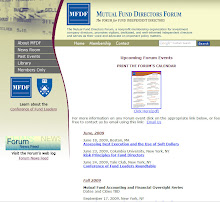In a June 18, 2009 address to the Spring 2009 Hedgeworld Fund Services Conference, SEC Commissioner Luis A. Aguilar outlined the systematic risks posed by private funds to the greater public markets. Driven primarily by institutional investors, the hedge fund industry grew to over $1.9 trllion in 2007. Even with recent market events, the hedge fund industry still managed approximately $1.3 trillion at the end of 2008. This explosive growth has prompted calls for regulation of hedge funds in the U.S. and abroad.
The first major systematic risk posed by hedge funds, according to Aguilar, is to market integrity. Given the disproportionate volume of activity of hedge funds, they can pose serious hazards to the markets as a whole during times of market stress. In other words, when hedge funds feel stress, the markets feel that same stress amplified.
The full text of Commissioner Aguilar's June 18, 2009 address is available at: http://www.sec.gov/news/speech/2009/spch061809laa.htm
The first major systematic risk posed by hedge funds, according to Aguilar, is to market integrity. Given the disproportionate volume of activity of hedge funds, they can pose serious hazards to the markets as a whole during times of market stress. In other words, when hedge funds feel stress, the markets feel that same stress amplified.
[H]edge funds reportedly account for more than 85% of the distressed debt market, and more than 80% of certain derivatives markets. Moreover, although hedge funds represent just 5% of all U.S. assets under management, they account for about 30% of all U.S. equity trading volume. In 2006, there were estimates that hedge funds were responsible for as much as half of the daily trading volume on the New York Stock Exchange.The second risk posed by hedge funds, according to Aguilar, is counterparty risk, which can be amplified by their leverage and lack of transparency.
. . .
[H]edge funds are major players in the capital markets for reasons other than trading activity. As this audience knows well, hedge funds have significant business relationships with the largest regulated commercial and investment banks — and act as trading counterparties for a wide range of OTC derivatives and other financing transactions.
Today, commercial banks and prime brokers are called upon to bear and manage the credit and counterparty risks that hedge fund leverage creates. Up until now, it has been assumed that market discipline would effectively prevent hedge funds from detrimentally impacting the capital markets or from posing systemic risk.Third, Aguilar addressed the concern that the hedge fund industry, as a result of its access to inside information, secrecy, lack of transparency, and lack of close oversight is a hotbed for insider trading.
. . .
[T]he risks of hedge funds are being externalized to the regulated market — prime brokers, banks, and their shareholders each were asked to bear the costs of managing hedge fund risks.
Hedge funds who participate in private placements, talk with trading desks, and maintain connections with the street are, in many cases, in a position to obtain inside information and to use it in a way that traditional surveillance may not detect. This potential for insider trading has been well publicized and public investors are concerned about the possible effects on market fairness and integrity.Given the extraordinary risks posed by unregulated funds to the greater markets, Commissioner Aguilar called for stronger regulation of hedge funds to protect not just the markets, but to focus on the protection of investors. Because the activities of hedge funds directly affect the savings and investments of all market participants, even retail investors, the rationale that hedge funds need not be highly regulated because they were vehicles only available to sophisticated investors who could look out for their own interests and negotiate effectively is no longer operative. Aguilar hinted at what hedge fund regulation might look like:
As you know, there has been a general discussion over whether hedge fund advisers and/or hedge funds should register. In my mind, hedge funds advisers with over $25 million in assets should register with the Commission, but that may not be enough. Many hedge fund advisers are currently registered with the SEC but we still lack a complete picture of what is going on in the industry. Some have suggested that hedge funds should also register. Others have suggested that it may be appropriate to apply limited concepts from within the Investment Company Act of 1940 to hedge funds — what some have called a “40 Act-lite” regime.
Perhaps a tiered approach to registration, based on a fund’s potential to affect the market, would make sense. At the lowest tier would be small funds. These funds could be subject to a simple recordkeeping requirement as to positions and transactions, kept in a standardized format, to permit the SEC to efficiently oversee their activities. As funds grow in size, different standards may be appropriate.
For funds that could significantly affect the market, it may be appropriate to require more than recordkeeping. For example, it may be appropriate to think through whether some of the risk limitation concepts built into the Investment Company Act make sense to apply to these hedge funds — such as imposing limits on leverage.
The full text of Commissioner Aguilar's June 18, 2009 address is available at: http://www.sec.gov/news/speech/2009/spch061809laa.htm





